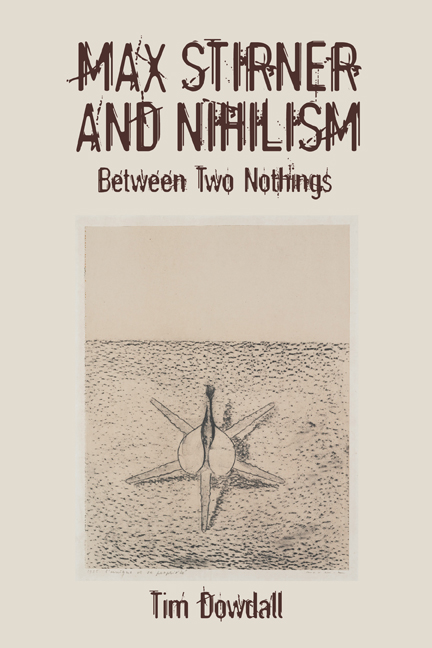Book contents
- Frontmatter
- Dedication
- Contents
- Acknowledgments
- Notes on Sources, Abbreviations, Translations, and Spelling
- Introduction: Stirner: Sinner or Saint?
- Chapter 1 The Origins of Disrepute: Stirner in Context
- Chapter 2 The Meaning of Nothing: Nihilism’s Complex Etymology
- Chapter 3 The Tragic Age for Europe: Nihilism from Nietzsche to Now
- Chapter 4 The Use and Abuse of Nihilism: Stirner under Fire
- Chapter 5 The State of Denial: Stirner and Political Nihilism
- Chapter 6 The Absence of Absolutes: Stirner and Moral Nihilism
- Chapter 7 The Fear of Nothing: Stirner and Existential Nihilism
- Conclusion: Stirner: The Happy Nihilist?
- Bibliography
- Index
Chapter 7 - The Fear of Nothing: Stirner and Existential Nihilism
Published online by Cambridge University Press: 09 May 2024
- Frontmatter
- Dedication
- Contents
- Acknowledgments
- Notes on Sources, Abbreviations, Translations, and Spelling
- Introduction: Stirner: Sinner or Saint?
- Chapter 1 The Origins of Disrepute: Stirner in Context
- Chapter 2 The Meaning of Nothing: Nihilism’s Complex Etymology
- Chapter 3 The Tragic Age for Europe: Nihilism from Nietzsche to Now
- Chapter 4 The Use and Abuse of Nihilism: Stirner under Fire
- Chapter 5 The State of Denial: Stirner and Political Nihilism
- Chapter 6 The Absence of Absolutes: Stirner and Moral Nihilism
- Chapter 7 The Fear of Nothing: Stirner and Existential Nihilism
- Conclusion: Stirner: The Happy Nihilist?
- Bibliography
- Index
Summary
The Existential Question
If the examination of the relationship between Stirner and political and moral nihilism has thrown up little more than inconclusive answers, the current chapter, which looks at the most familiar form of nihilism in modern parlance, existential nihilism, offers the opportunity to come down decisively on one side of the argument or the other. Although Stirner has rarely been accused explicitly of being an existential nihilist, it is the sense behind most of the examples of his association with nihilism since World War II. During this time, Stirner has been described as an existentialist far more frequently than as an existential nihilist, but the link between his supposed existentialist characteristics and his nihilistic tendencies is often at least implied.
Carr defines existential nihilism as “the feeling of emptiness and pointlessness that follows from the judgment, ‘Life has no meaning.’” This understanding of nihilism has become so prevalent that Gertz, in his recent book on the subject, barely discusses it in any other sense. Although he recognizes nihilism's complexity and diversity, all definitions, in his analysis, ultimately revolve around the absence of meaning: “Nihilism is not merely the denial that life is inherently meaningful, as nihilism can instead be seen as a particular way of responding to the anxiety caused by the discovery of life's inherent meaninglessness.” The predominance of existential nihilism over all other types of nihilism has been attested to by numerous modern commentators. Crosby attributes its primacy to its widespread use, its ability to subsume other forms, such as moral, epistemological, and cosmic nihilism, and its broad relevance to life in general rather than to a specific discipline. Thus, he concludes that “existential nihilism is the most basic and inclusive, and therefore the most important, form of nihilism.” Carr likewise recognizes existential nihilism as “probably the most commonplace sense of the word,” noting its significance in modern literature (citing Dostoevsky and Camus) and observing that Nietzsche was “preoccupied with this form,” although it might be more accurate to say he invented it.
Existential nihilism can be considered not just the heir to, but also the fulfillment of Nietzsche's infamous prophecy: “What I relate is the history of the next two centuries. I describe what is coming, what is inevitable: the rise of nihilism.”
- Type
- Chapter
- Information
- Max Stirner and NihilismBetween Two Nothings, pp. 186 - 233Publisher: Boydell & BrewerPrint publication year: 2024

